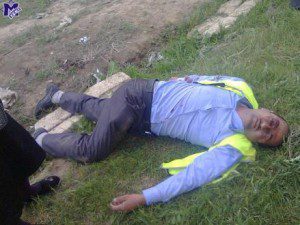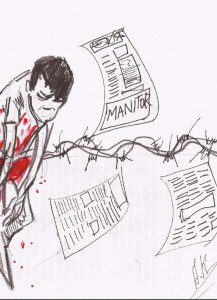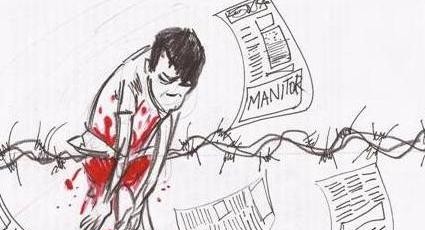20 Apr 2012 | Azerbaijan Letters, Azerbaijan News, Europe and Central Asia, News and features
Index on Censorship joins the call for an immediate, independent and transparent investigation into the brutal attack on investigative journalist and Index award winner Idrak Abbasov
(more…)
18 Apr 2012 | Azerbaijan News, Europe and Central Asia, Index Index, News and features
 Azerbaijani journalist and Index award-winner Idrak Abbasov was brutally assaulted today. (more…)
Azerbaijani journalist and Index award-winner Idrak Abbasov was brutally assaulted today. (more…)
27 Mar 2012 | Azerbaijan News, Europe and Central Asia, News and features
 As the international community looks forward to the Eurovision Song Contest, Azerbaijan is working hard to present itself as a modern, democratic country. But a new report from Index and partners paints a very different picture
As the international community looks forward to the Eurovision Song Contest, Azerbaijan is working hard to present itself as a modern, democratic country. But a new report from Index and partners paints a very different picture
(more…)
26 Mar 2012 | Azerbaijan, Azerbaijan News, Index Reports

Read the full report: Running Scared: Azerbaijan’s silenced voices
This report is a publication of the International Partnership Group for Azerbaijan (IPGA), a coalition of international organisations working to promote and protect freedom of expression in Azerbaijan. It examines the freedom of expression situation in Azerbaijan from the time of the IPGA’s joint mission to the country in September 2010 to March 2012.
The current state of freedom of expression in Azerbaijan is alarming, as the cycle of violence against journalists and impunity for their attackers continues; journalists, bloggers, human rights defenders and political and civic activists face increasing pressure, harassment and interference from the authorities; and many who express opinions critical of the authorities – whether through traditional media, online, or by taking to the streets in protest – find themselves imprisoned or otherwise targeted in retaliation.
Issues examined in this report include: impunity for violence against journalists; political use of the law to silence freedom of expression; restrictions on the right to freedom of peaceful assembly; pressure against NGOs, human rights defenders and lawyers; restrictions on the right to freedom of information; the situation of freedom of expression online; state control of the media; ethics, professionalism and self-regulation of the media; and Azerbaijan’s efforts to promote a positive image abroad despite the freedom of expression problems in the country.
Read the full report



